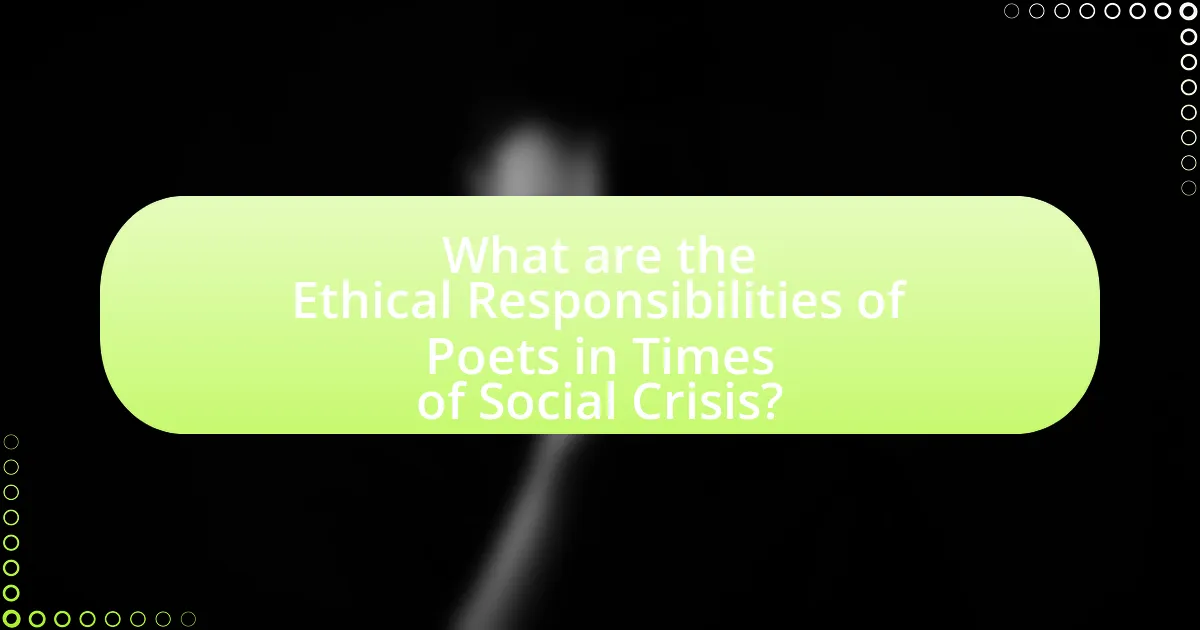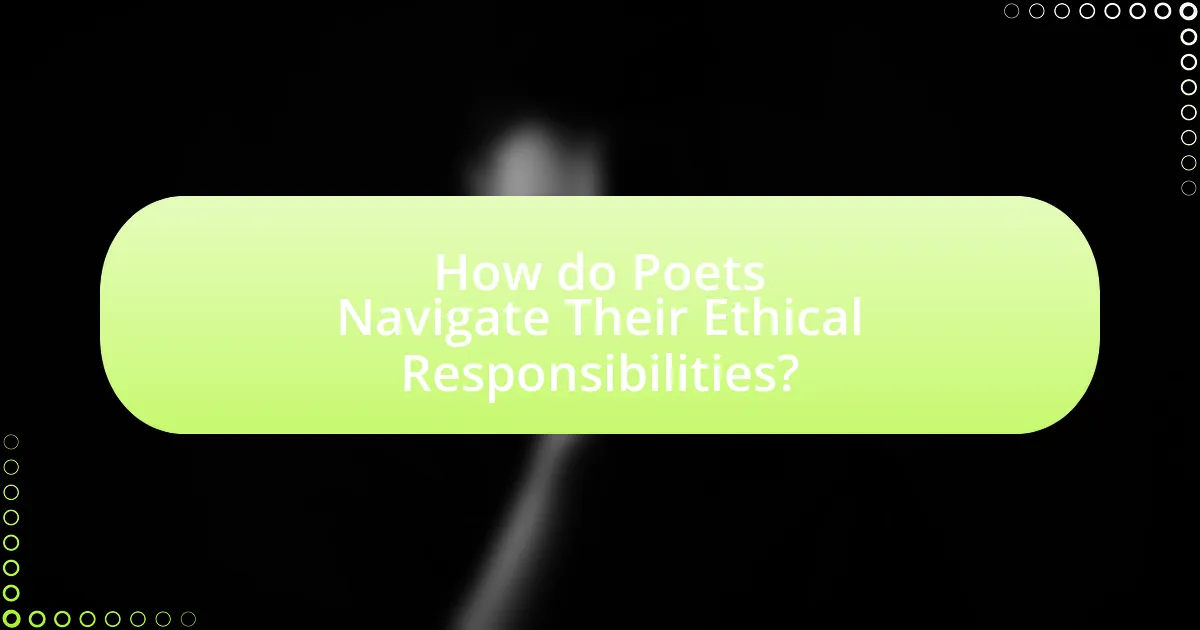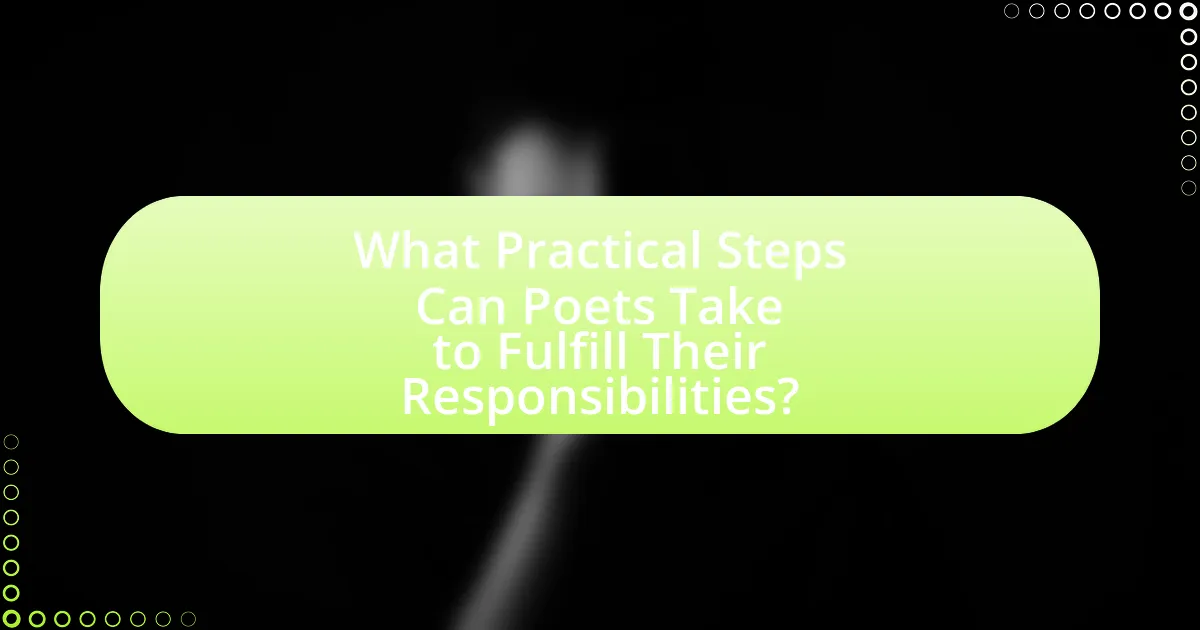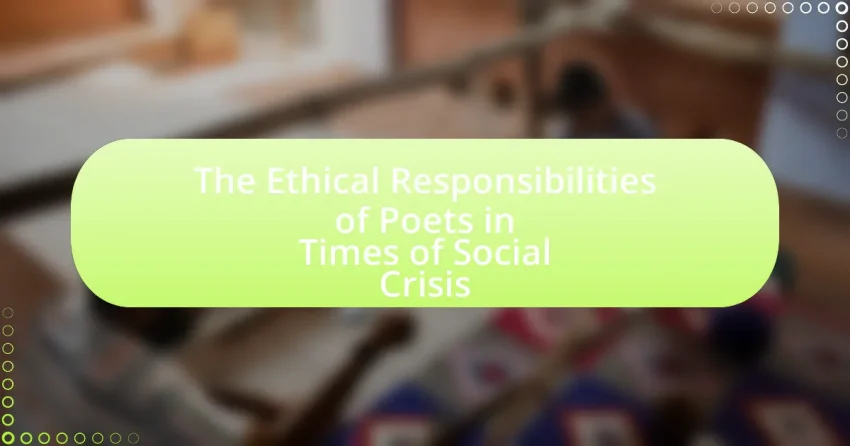The article examines the ethical responsibilities of poets during social crises, emphasizing their role in amplifying marginalized voices and addressing social injustices. It highlights how poetry can evoke empathy, provoke thought, and inspire action, with historical examples such as Langston Hughes and Maya Angelou illustrating the impact of poetic expression on social movements. The discussion includes the challenges poets face, such as censorship and backlash, and outlines practical steps they can take to engage with their communities and fulfill their responsibilities effectively. Additionally, it addresses best practices for maintaining authenticity and social responsibility in their work.

What are the Ethical Responsibilities of Poets in Times of Social Crisis?
Poets have the ethical responsibility to amplify marginalized voices and address social injustices during times of crisis. This role is crucial as poetry can evoke empathy, provoke thought, and inspire action among audiences. Historical examples, such as the works of Langston Hughes during the Harlem Renaissance or Maya Angelou’s writings during the Civil Rights Movement, demonstrate how poets have effectively highlighted societal issues and mobilized public sentiment. By using their craft to reflect the realities of oppression and resilience, poets contribute to social awareness and encourage collective healing and change.
How do poets influence social change during crises?
Poets influence social change during crises by articulating collective emotions and experiences, thereby fostering empathy and awareness. Their work often highlights injustices and galvanizes public sentiment, as seen in the poetry of Langston Hughes during the Harlem Renaissance, which addressed racial inequality and inspired activism. Additionally, poets like Maya Angelou have used their verses to confront social issues, encouraging dialogue and reflection among audiences. This capacity to resonate with individuals on a personal level can mobilize communities and inspire movements, as evidenced by the impact of poetry in the Civil Rights Movement, where spoken word became a tool for advocacy and change.
What role does poetry play in raising awareness about social issues?
Poetry serves as a powerful medium for raising awareness about social issues by conveying complex emotions and experiences in a relatable manner. Through vivid imagery and evocative language, poets can highlight injustices, provoke thought, and inspire action among readers. For instance, works like “Still I Rise” by Maya Angelou address themes of resilience and racial inequality, effectively engaging audiences and fostering empathy. Additionally, poetry can encapsulate the voices of marginalized communities, bringing attention to their struggles and perspectives, as seen in the writings of poets like Audre Lorde. This ability to resonate emotionally and socially makes poetry an essential tool for advocacy and change in times of crisis.
How can poets use their platform to advocate for marginalized voices?
Poets can use their platform to advocate for marginalized voices by amplifying their stories and experiences through their work. By incorporating themes of social justice, inequality, and personal narratives of marginalized communities into their poetry, poets can raise awareness and foster empathy among their audiences. For instance, poets like Claudia Rankine and Ocean Vuong have effectively highlighted issues of race, identity, and belonging, thereby giving voice to those often overlooked in mainstream discourse. This approach not only educates readers but also encourages dialogue and action, making poetry a powerful tool for social change.
Why is it important for poets to address social crises?
Poets play a crucial role in addressing social crises because their work can raise awareness, inspire change, and foster empathy among audiences. By articulating the emotional and social realities of crises, poets can give voice to marginalized communities and highlight injustices that may otherwise go unnoticed. Historical examples, such as the poetry of Langston Hughes during the Harlem Renaissance, illustrate how poets can influence public perception and mobilize social movements. Furthermore, poetry can distill complex issues into accessible language, making it easier for individuals to engage with and understand the implications of social crises.
What historical examples illustrate the impact of poetry in social movements?
Poetry has significantly impacted social movements throughout history, with notable examples including the Harlem Renaissance and the anti-apartheid movement in South Africa. During the Harlem Renaissance, poets like Langston Hughes used their work to express the struggles and aspirations of African Americans, fostering a sense of identity and community that fueled the civil rights movement. Similarly, in South Africa, poets such as Antjie Krog and the collective works of the Black Consciousness Movement utilized poetry to articulate resistance against apartheid, mobilizing public sentiment and inspiring activism. These instances demonstrate how poetry serves as a powerful tool for social change, articulating collective grievances and aspirations while galvanizing communities toward action.
How does the emotional power of poetry resonate with audiences during crises?
The emotional power of poetry resonates with audiences during crises by providing a means of expression and connection that transcends individual experiences. Poetry captures complex emotions, allowing individuals to articulate feelings of grief, fear, and hope, which can be particularly potent in times of social upheaval. For instance, during the COVID-19 pandemic, poets like Amanda Gorman used their work to address collective anxieties and inspire resilience, demonstrating how poetry can foster a sense of community and shared understanding. This emotional resonance is supported by studies indicating that engaging with poetry can enhance emotional processing and promote healing, making it a vital tool for coping during challenging times.
What challenges do poets face when addressing social issues?
Poets face significant challenges when addressing social issues, primarily due to the need to balance artistic expression with ethical considerations. This balance is crucial as poets must navigate the complexities of representing marginalized voices authentically while avoiding appropriation or misrepresentation. Additionally, poets often encounter resistance from audiences who may disagree with their perspectives or feel uncomfortable with the topics being addressed, which can lead to censorship or backlash. Historical examples, such as the backlash against poets like Allen Ginsberg during the 1960s for their political content, illustrate the potential consequences of addressing contentious social issues. Furthermore, the emotional weight of these topics can lead to personal struggles for poets, as they grapple with their own experiences and the broader societal implications of their work.
How can censorship affect a poet’s ability to speak out?
Censorship significantly restricts a poet’s ability to express their thoughts and emotions freely. When authorities impose limitations on what can be written or shared, poets may face legal repercussions, social ostracism, or even violence for their work. Historical examples include the censorship of poets during totalitarian regimes, such as the Soviet Union, where writers like Anna Akhmatova faced severe restrictions that stifled their voices and limited their creative expression. This suppression not only hinders individual poets but also diminishes the overall cultural discourse, as diverse perspectives are silenced, leading to a homogenized narrative that fails to address critical social issues.
What are the risks of backlash for poets who engage in political discourse?
Poets who engage in political discourse face significant risks of backlash, including public criticism, social ostracism, and potential threats to their safety. Engaging in political themes can provoke strong reactions from audiences who may disagree with the poet’s views, leading to negative responses on social media or in public forums. For instance, poets like Amanda Gorman have faced both acclaim and backlash for their politically charged works, illustrating the polarized reception of political poetry. Additionally, historical examples show that poets have been censored or faced legal repercussions for their political expressions, as seen during regimes that suppress dissenting voices. These risks highlight the delicate balance poets must navigate between artistic expression and societal response.

How do Poets Navigate Their Ethical Responsibilities?
Poets navigate their ethical responsibilities by critically engaging with social issues and reflecting the complexities of human experience in their work. They often utilize their platform to raise awareness about injustices, challenge societal norms, and give voice to marginalized communities. For instance, poets like Maya Angelou and Langston Hughes have historically addressed racial inequality and social injustice through their poetry, influencing public discourse and fostering empathy. This engagement not only holds poets accountable to their audience but also emphasizes the role of poetry as a catalyst for social change, demonstrating that ethical responsibility in poetry is intertwined with the broader societal context.
What ethical considerations should poets keep in mind?
Poets should prioritize authenticity, respect for subjects, and social responsibility in their work. Authenticity ensures that poets convey genuine experiences and emotions, fostering trust with their audience. Respect for subjects, particularly marginalized voices, is crucial to avoid exploitation and misrepresentation. Social responsibility compels poets to consider the impact of their words on societal issues, as poetry can influence public perception and discourse. For instance, during social crises, poets have historically played a role in advocating for change, as seen in the works of poets like Maya Angelou and Langston Hughes, who addressed racial injustice and inequality. These ethical considerations guide poets in creating meaningful and impactful literature.
How can poets balance personal expression with social responsibility?
Poets can balance personal expression with social responsibility by integrating their individual experiences and emotions into broader societal themes, thereby creating work that resonates on both personal and communal levels. This approach allows poets to maintain authenticity while addressing pressing social issues, such as inequality or injustice. For instance, poets like Maya Angelou and Langston Hughes have effectively used their personal narratives to highlight systemic problems, demonstrating that personal expression can serve as a powerful vehicle for social commentary. By doing so, they not only express their unique voices but also engage their audiences in critical conversations about societal challenges, thus fulfilling their ethical responsibilities as artists in times of social crisis.
What guidelines can poets follow to ensure ethical engagement?
Poets can ensure ethical engagement by prioritizing authenticity, respect, and social responsibility in their work. Authenticity involves expressing genuine emotions and experiences, which fosters a deeper connection with audiences. Respect entails acknowledging the voices and experiences of marginalized communities, avoiding appropriation, and giving credit where it is due. Social responsibility requires poets to address social issues thoughtfully, using their platform to raise awareness and promote positive change. For instance, poets like Amanda Gorman have effectively used their art to highlight social justice themes, demonstrating the impact of ethical engagement in poetry.
How do poets maintain authenticity while addressing social issues?
Poets maintain authenticity while addressing social issues by drawing from personal experiences and cultural backgrounds, which allows them to convey genuine emotions and perspectives. This connection to their own lives and communities fosters a sense of credibility and relatability in their work. For instance, poets like Maya Angelou and Langston Hughes have effectively used their own narratives and historical contexts to highlight social injustices, making their messages resonate deeply with audiences. By prioritizing honesty and vulnerability in their writing, poets can engage with complex social issues in a way that reflects true lived experiences, thus reinforcing their authenticity.
What strategies can poets use to connect authentically with their audience?
Poets can connect authentically with their audience by employing personal experiences and emotions in their work. This strategy allows poets to create relatable content that resonates with readers, fostering a sense of shared understanding. For instance, poets like Maya Angelou have effectively used their life stories to address social issues, which not only engages the audience but also evokes empathy and reflection. By weaving in cultural references and contemporary issues, poets can further enhance this connection, making their work relevant and impactful in times of social crisis.
How can poets avoid appropriation when writing about social crises?
Poets can avoid appropriation when writing about social crises by prioritizing authentic representation and engaging with affected communities. This involves conducting thorough research to understand the nuances of the crisis and listening to the voices of those directly impacted. For instance, poets can collaborate with individuals from marginalized groups to ensure their perspectives are accurately portrayed, thereby fostering a sense of solidarity rather than exploitation. Engaging in this manner not only respects the lived experiences of others but also enriches the poet’s work with genuine insights, promoting ethical storytelling.

What Practical Steps Can Poets Take to Fulfill Their Responsibilities?
Poets can fulfill their responsibilities by actively engaging with social issues through their work. This involves using their platform to raise awareness about injustices, fostering empathy, and inspiring action among their audience. For instance, poets can participate in community events, collaborate with activists, and publish works that reflect the struggles faced by marginalized groups. Historical examples include poets like Langston Hughes, who addressed racial inequality during the Harlem Renaissance, demonstrating the impact of poetry in advocating for social change. By doing so, poets not only contribute to the discourse but also hold themselves accountable to the communities they represent.
How can poets effectively engage with their communities?
Poets can effectively engage with their communities by organizing and participating in local events, such as open mic nights, poetry readings, and workshops that encourage public participation. These activities foster a sense of belonging and allow poets to share their work while also listening to the voices of community members. For instance, initiatives like “Poetry in the Parks” have successfully brought poetry to diverse audiences, enhancing community cohesion and dialogue. Engaging with local issues through poetry can also raise awareness and inspire action, as seen in the work of poets who address social justice themes relevant to their communities.
What are some collaborative projects poets can undertake during crises?
Poets can undertake collaborative projects such as community poetry workshops, online poetry readings, and collective anthologies during crises. Community poetry workshops allow poets to engage with local voices, fostering a sense of solidarity and shared experience. Online poetry readings can reach wider audiences, providing a platform for diverse perspectives and emotional support. Collective anthologies can compile works that reflect the sentiments of the time, preserving the historical context and offering a collective narrative. These projects not only amplify voices but also create a sense of community and resilience in challenging times.
How can poets utilize social media to amplify their messages?
Poets can utilize social media to amplify their messages by creating engaging content that resonates with their audience and encourages sharing. By leveraging platforms like Twitter, Instagram, and TikTok, poets can reach wider audiences through multimedia formats such as videos, images, and hashtags that align with social issues. For instance, the hashtag #BlackLivesMatter has been used by poets to connect their work to social justice movements, increasing visibility and engagement. Additionally, social media allows for real-time interaction, enabling poets to participate in discussions and respond to current events, thereby enhancing the relevance of their messages. This approach not only broadens their reach but also fosters community and dialogue around important topics.
What resources are available for poets seeking to address social issues?
Poets seeking to address social issues can access various resources, including workshops, grants, and online platforms dedicated to social justice poetry. Organizations like the Poetry Foundation and the Academy of American Poets offer funding opportunities and educational resources that support poets in exploring and articulating social themes. Additionally, platforms such as Write About Now and The Poetry Project provide spaces for poets to share their work and connect with like-minded individuals focused on social change. These resources empower poets to engage with pressing societal issues through their art, fostering a community that values ethical responsibility in creative expression.
Which organizations support poets in their advocacy efforts?
Organizations that support poets in their advocacy efforts include the Academy of American Poets, which provides resources and funding for poets to engage in social issues, and the Poetry Foundation, which promotes poetry as a means of social change. Additionally, the National Endowment for the Arts offers grants that enable poets to participate in advocacy through their work. These organizations validate their support by actively funding projects that align poetry with social justice initiatives, thereby reinforcing the role of poets in addressing societal challenges.
How can poets access workshops or training on social justice themes?
Poets can access workshops or training on social justice themes through various organizations and platforms dedicated to social justice education. Many nonprofit organizations, such as the Poetry Foundation and the Center for Cultural Power, offer workshops that focus on integrating social justice themes into poetry. Additionally, universities and community colleges often provide courses or workshops that explore the intersection of poetry and social justice. Online platforms like Coursera and Skillshare also feature courses led by experienced poets and activists that emphasize social justice issues. These resources are designed to equip poets with the necessary skills and knowledge to address social justice themes effectively in their work.
What are best practices for poets in times of social crisis?
Poets should prioritize authenticity and empathy in their work during times of social crisis. Authenticity ensures that their voices resonate truthfully with the experiences of those affected, while empathy allows them to connect deeply with the emotions and struggles of individuals and communities. For instance, poets like Maya Angelou and Langston Hughes have historically used their platforms to address social injustices, effectively amplifying marginalized voices and fostering solidarity. Engaging with the community through workshops or public readings can also provide a space for collective healing and dialogue, reinforcing the poet’s role as a catalyst for change.
How can poets ensure their work is impactful and responsible?
Poets can ensure their work is impactful and responsible by engaging deeply with the social issues they address and prioritizing authenticity in their voice. By researching and understanding the contexts of the themes they explore, poets can create work that resonates with audiences and reflects the complexities of societal challenges. For instance, poets like Maya Angelou and Langston Hughes have effectively used their platforms to highlight social injustices, demonstrating the power of poetry to inspire change and foster empathy. This approach not only enhances the emotional weight of their work but also encourages critical dialogue among readers, making poetry a tool for social awareness and responsibility.
What tips can poets follow to engage their audience effectively?
Poets can engage their audience effectively by using vivid imagery and relatable themes. Vivid imagery helps create strong mental pictures, making the poem more memorable and impactful. For instance, a study published in the Journal of Poetry Therapy found that poems with rich sensory details resonate more with readers, enhancing emotional connection. Additionally, addressing universal themes such as love, loss, or social justice allows poets to connect with diverse audiences, as these topics often reflect shared human experiences. By combining these techniques, poets can foster deeper engagement and provoke thoughtful reflection among their audience.
